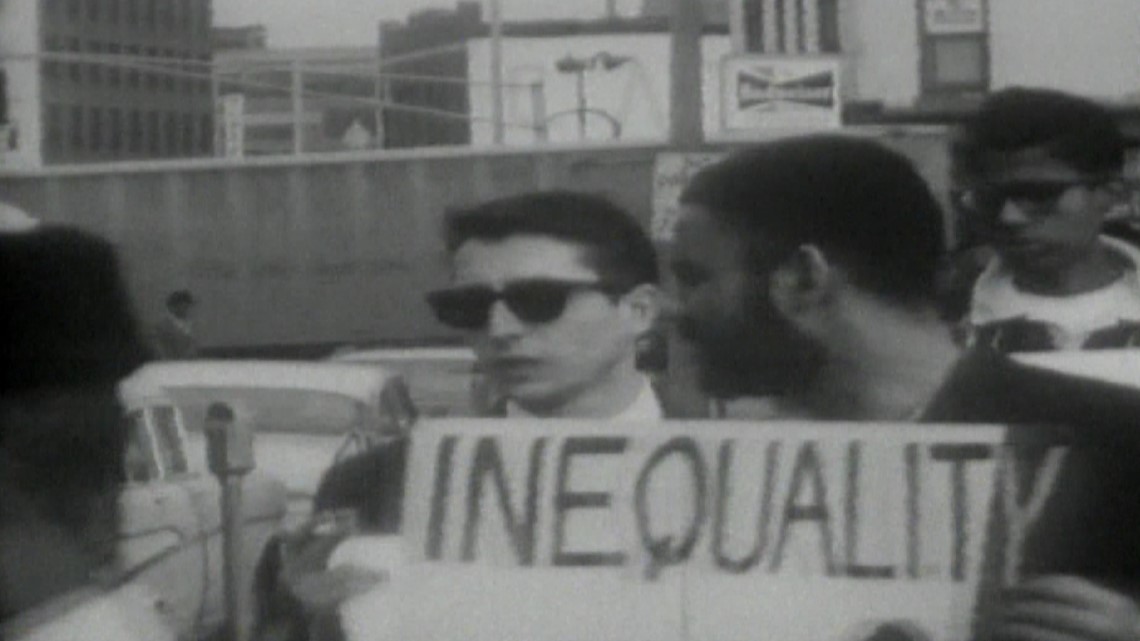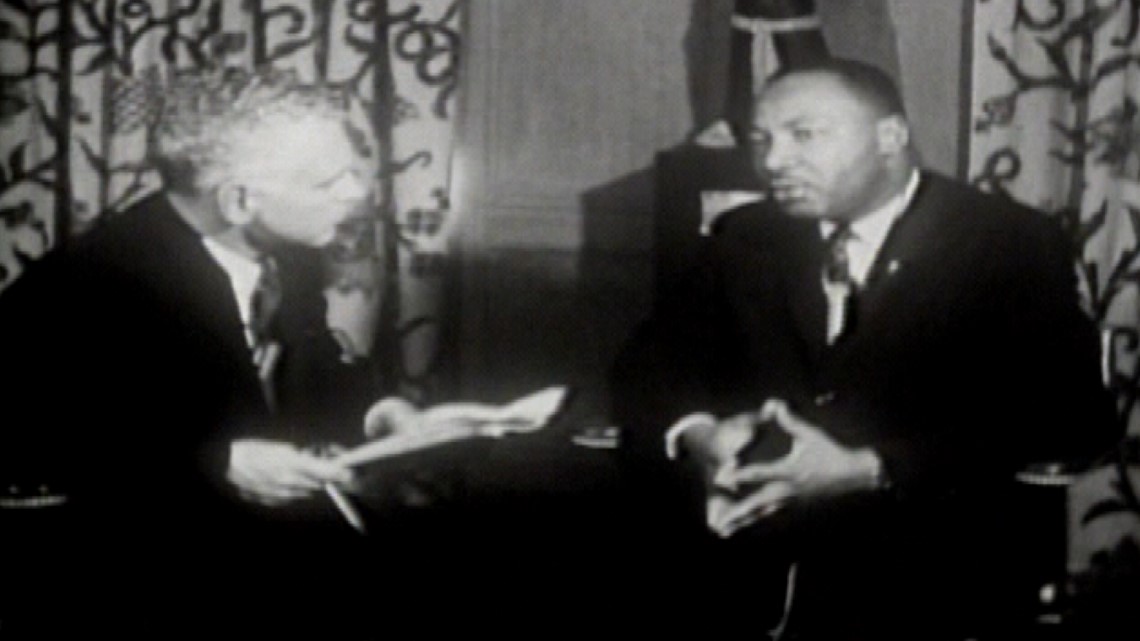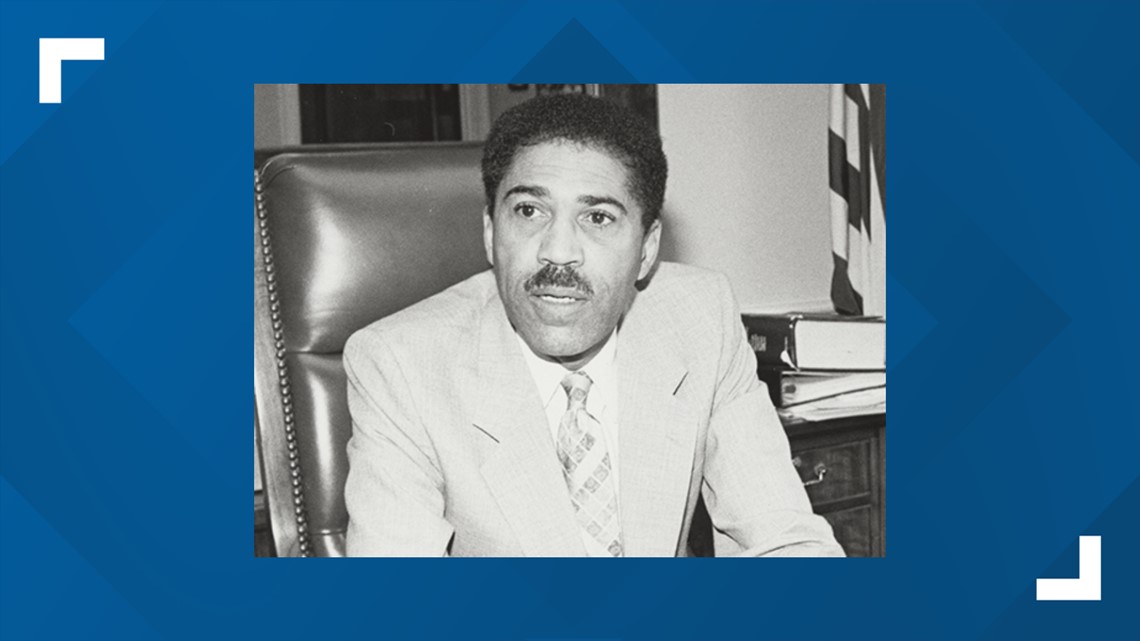From Jefferson Bank Protest to scaling the Arch: St. Louis' place in the history of the fight for civil rights
St. Louis was witness to civil rights demonstrations in the 1960s, including the Jefferson Bank Protests, a visit from MLK and the scaling of the Arch.

KSDK is celebrating its 75th Anniversary this year by looking back at the history of the station and our city. You can take a trip down memory lane all year long with our anniversary content on ksdk.com/75.
Jefferson Bank protests Activists call for equal opportunities


The civil rights movement of the mid-1960s brought a call to end racial discrimination in St. Louis and across the country. In St. Louis, activists took to the streets, and in one case scaled the side of the Arch, to bring attention to the cause of civil rights.
To this day, the Jefferson Bank Protests in 1963 are some of the most significant events of the modern civil rights era. It all began on Aug. 30.
Protests were led by the St. Louis Committee of Racial Equality, better known as CORE. They urged the bank to hire more Black employees.
Activists were working to change that when things got tense with Jefferson Bank. The bank got a court order to block protestors, but that didn't stop the demonstrators. When they showed up police were on hand, and several protesters were arrested.
The non-violent protests resulted in more than 500 arrests. The demonstrations and lawsuits continued for four years, with CORE leaders saying it was an effective fight for equal rights.
Percy Green was one of those original protestors, and he returned to Jefferson Bank in 2018 to mark the anniversary of the original protest. He recalled some of the protestors in 1963 spending almost a year in jail.
"It was almost like punishing protestors for having the nerve or audacity to protest," said Green.
MLK visits St. Louis Martin Luther King Jr. discusses Civil Rights bill


The call for equal opportunities grew louder the following March when Dr. Martin Luther King Jr. sat down for an interview with us and spoke in St. Louis.
“God is not interested merely in the freedom of Black men and brown men and yellow men, God is interested in them as a whole human race,” King said in a speech.
America was still months away from the passage of the Civil Rights Act, which would prohibit discrimination and break down barriers.
“The importance of the bill will be determined by the implementation of the bill,” King said of the Civil Rights Act in an interview with us. “If we don’t get the bill we will get more demonstrations."
The Civil Rights Act was signed into law on July 2, 1964. And 12 days later came an iconic moment in St. Louis history.
Scaling the Arch Protesters climb the under-construction Arch


Two civil rights activists climbed 125 feet up a construction ladder of the half-built Gateway Arch.
Percy Green and Richard Daly, members of CORE, demanded more jobs for Black workers at the site.
They safely made it back down and went limp when police told them they were under arrest.
All these efforts led to more jobs and opportunities for our Black communities in St. Louis. These voices and moments impacted decades to come.
Protester to US Congressman Lacy Clay Sr. emerges as local leader


One of the voices to emerge from the protests in St. Louis was William Lacy Clay Sr., a young city alderman at the time. Clay was one of the leaders of the Jefferson Bank Protests. He was arrested and jailed for nearly four months.
“I think things were accomplished that far outweighed the 112 days I spent in jail,” Clay was quoted in a U.S. House of Representatives biography, alluding to a subsequent change in bank policy that increased the number of African Americans in professional positions.
Clay’s involvement in local protests and labor organizations helped pave the way for his election in a newly reapportioned district made up of north St. Louis and some outlying counties. He served in Congress for more than 30 years and was one of the founding members of the Congressional Black Caucus.
Upon his retirement, Clay’s son William Lacy Clay Jr. was elected to represent the district, becoming the second Black father and son ever to serve in Congress. The Clay family held the seat until 2020, when activist Cori Bush defeated Lacy Clay Jr. in the Democratic primary. She won the general election months later to become the first Black woman to represent the state in Congress.
In her first term in Congress, Bush has seen her profile rise by being an advocate on issues like evictions and child tax credits during debates over pandemic relief.
5 at 75 Anniversary celebration
We are continuing to remember the biggest moments in St. Louis history over the last 75 years as 5 On Your Side celebrates its 75th anniversary in 2022. Take a walk back in time with some of the biggest stories from each decade:
Be sure to learn more about our banner show at locations throughout the Bi-state.
Find complete 5 On Your Side anniversary coverage, stories and videos at ksdk.com/75.


